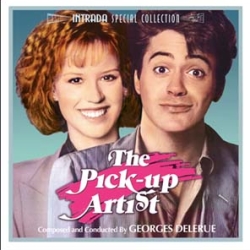THE PICK-UP ARTIST – Georges Delerue
Original Review by Jonathan Broxton
The Pick-Up Artist is a romantic comedy written and directed by James Toback, starring Robert Downey Jr. as Jack Jericho, an egotistical ladies man with a penchant for picking up beautiful women, but then discarding them without a second thought. Jack’s world is thrown into turmoil when he meets Randy Jensen (Molly Ringwald), a smart, independent tour guide whose post-coital indifference to him only causes him to become more smitten. Desperate to find a way to get into Randy’s good books, Jack offers to pay off her alcoholic father’s gambling debts, a decision he comes to regret once he finds himself locking horns with some local Mafioso. The film has a great supporting cast, including Dennis Hopper, Danny Aiello, and Harvey Keitel, but unfortunately it was both a critical and commercial flop, with Roger Ebert calling it “an appallingly silly movie, from its juvenile comic overture to its dreadfully sincere conclusion.”
The score for The Pick-Up Artist was by the great French composer Georges Delerue, who had scored director Toback’s previous film, Exposed, in 1983. I’ve made this observation before, but after winning the Oscar for A Little Romance in 1979 and subsequently becoming more involved in the Hollywood film music scene, Delerue was asked to score far too many movies that were absolute stinkers, with The Pick-Up Artist being one of them. Delerue had such a unique voice, and his music was filled with so much charm and wit and personality, but the studio heads never knew how best to use his talents. Once in a while he got something worthy – Agnes of God, for example – but too often he was stuck scoring silly comedies and maudlin melodramas instead of writing music for important films which gave him enough room for his style to breathe.
Having said that, the music Delerue did write for these films was often superb, vastly outstripping the quality of the films themselves, and The Pick-Up Artist is another one in a long list of titles like that. Somewhat bizarrely, director Toback removed most of Delerue’s score before the film was released, and replaced it with last-minute music provided by a very young Joel McNeely, among others. The first note of Delerue’s score isn’t heard until forty-eight minutes into the film, and all tolled there’s probably not more than five minutes of the approximately twenty-five minutes that Delerue wrote in the final cut of the film, and even what’s there reuses the same cue at least twice. However, thankfully, we have the soundtrack album to show us what music could have been heard had Toback not messed around with it so much.
Delerue’s music is tender, melodic, and wholly beautiful, a quintessential Delerue romance score. The opening piece, “New York,” is actually a suite of a couple of shorter cues, each of them effortlessly charming, endearing, sunny melodies for flute over strings and harp that overflow with Delerue’s compositional characteristics. The second of them, beginning at 1:54, is the film’s recurring main theme, and introduces a new sound – that of a marimba – into the palette, conveying just a touch of the Big Apple’s contemporary vibe alongside the lush romance.
The second cue, “A Thing of Beauty,” is one of the most aptly-titled cues in the history of film music; it begins with a heartbreakingly beautiful piano melody over vaguely Bach-like strings that is simply sublime, before eventually turning into an equally gorgeous melody for solo oboe. I’ve said this before, but no-one – no-one – has ever written melodies with the style that Georges Delerue did. It’s immediately recognizable, unmistakable, with chord progressions and harmonies that were unique to him, rich and luscious and endlessly listenable.
“Happiness” has a more old-fashioned, almost lounge-jazzy sound, with layered strings, smooth brasses, and light woodwinds backed by softly brushed snares and tapped cymbals; still delightful, but in an entirely different way. “The Loss” is darker and more melancholy, featuring a subdued electric guitar as the lead instrument. “The Win” reprises the main theme with a searching statement for a bed of strings, sentimental woodwinds, and a magical cascade of harp glissandi. The final performance of “The Theme” transfers the lead melodic line to a sumptuous solo cello, moves through a bittersweet sequence for oboe, flute, and winsome strings, before ending with a upbeat, cathartic final reprise for piano which is just gorgeous.
The score for The Pick-Up Artist has been released twice and, as it is so short at just a hair under half an hour, both times it came as part of a double-score set. The 2006 release from Intrada Records and producer Nick Redman combines it with Richard Rodney Bennett’s 1976 score for Sherlock Holmes in New York, while the 2015 release from Bruce Kimmel’s Kritzerland label combines it with Delerue’s score for the 1965 film La Fleur de l’Âge, also known as Rapture. Both albums are recommended as equally good representations of the music. In addition, a 7-minute suite of the score from The Pick-Up Artist can be found on Volume 2 of Varese Sarabande’s spectacular Georges Delerue London Sessions albums, which are a magnificent primer for anyone unfamiliar with the genius Frenchman’s music.
Buy the Pick-Up Artist soundtrack from the Movie Music UK Store
Track Listing:
- New York (5:22)
- A Thing of Beauty (4:22)
- Happiness (7:52)
- The Loss (1:26)
- The Win (3:32)
- The Theme (3:23)
- Together At Last (0:50)
Running Time: 26 minutes 47 seconds
Intrada ISC-37 (1987/2006)
Kritzerland (1987/2015)
Music composed and conducted by Georges Delerue. Orchestrations by Georges Delerue. Recorded and mixed by XXX. Edited by Tom Villano. Score produced by Georges Delerue. Intrada album produced by Nick Redman, Douglass Fake and Roger Feigelson. Kritzerland album produced by Bruce Kimmel.


